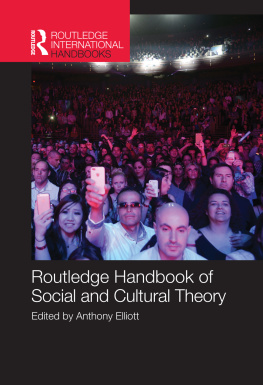Routledge Revivals
Unmasking Masculinity
In this detailed investigation of masculine gendered identity, first published in 1990, David Jackson uses his own personal history to look at the specific ways in which men become masculine. In doing so he examines, but also offers some positive challenges to, the assumed qualities and values of growing up manly. Jackson looks closely at the psychological and social forces active in his own development: relations with his father, violence at school, male banter and joking, sporting activities, boys comics, and sexual relations. The title is a deliberate blend between life story and critical commentary that makes use of some areas of post-structuralist theory to make visible the social and emotional processes that contribute to one mans life history. With an innovative theoretical approach, this reissue will be of particular value to those interested in the social, psychological and cultural forces that have gone into the historical shaping of men and masculinities.
Unmasking Masculinity
A Critical Autobiography
David Jackson
First published in 1990
by Unwin Hyman Ltd
This edition first published in 2015 by Routledge
2 Park Square, Milton Park, Abingdon, Oxon, OX14 4RN
and by Routledge
711 Third Avenue, New York, NY 10017
Routledge is an imprint of the Taylor & Francis Group, an informa business
1990 David Jackson
The right of Mats Lundahl to be identified as author of this work has been asserted by him in accordance with sections 77 and 78 of the Copyright, Designs and Patents Act 1988.
All rights reserved. No part of this book may be reprinted or reproduced or utilised in any form or by any electronic, mechanical, or other means, now known or hereafter invented, including photocopying and recording, or in any information storage or retrieval system, without permission in writing from the publishers.
Publishers Note
The publisher has gone to great lengths to ensure the quality of this reprint but points out that some imperfections in the original copies may be apparent.
Disclaimer
The publisher has made every effort to trace copyright holders and welcomes correspondence from those they have been unable to contact.
A Library of Congress record exists under LC control number: 90012525
ISBN 13: 978-1-138-80869-0 (hbk)
ISBN 13: 978-1-315-75051-4 (ebk)
UNMASKING MASCULINITY
A critical autobiography
DAVID JACKSON
David Jackson 1990
This book is copyright under the Berne Convention. No
reproduction without permission. All rights reserved.
Published by the Academic Division of
Unwin Hyman Ltd
15/17 Broadwick Street, London Wl V IFP, UK
Unwin Hyman Inc.
955 Massachusetts Avenue, Cambridge, MA 02139, USA
Allen & Unwin (Australia) Ltd,
8 Napier Street, North Sydney, NSW 2060, Australia
Allen & Unwin (New Zealand) Ltd in association with the
Port Nicholson Press Ltd,
Compusales Building, 75 Ghuznee Street, Wellington 1, New Zealand
First published in 1990
British Library Cataloguing in Publication Data
Jackson, David
Unmasking masculinity : a critical autobiography. (Men,
masculinities and social theory).
1. Masculinity II. Series
692.5
ISBN 0-04-445553-4
ISBN 0-04-445552-6 pbk
Library of Congress Cataloging in Publication Data
Jackson, David.
Unmasking masculinity: a critical autobiography / David Jackson.
p. cm.
Includes bibliographical references and index.
ISBN 0-04-445553-4 : $49.95 (U.S.). ISBN 0-04-445552-6 (pbk.) $14.95
(U.S.)
1. Jackson, David. 2. MenUnited StatesBiography.
3. MenUnited StatesPsychology. 4. Masculinity
(Psychology)United States. I. Title.
HQ1090.3.J33 1990
Typeset in 10 on 12 Bembo
Printed by Billing and Son, London and Worcester.
Contents
I would like to express my thanks and my sense of being indebted to all those people who sustained, motivated and challenged me while writing this book.
It was only through their continuing support, encouragement and often detailed re-reading that I was able to keep going.
So a warm thanks to: Brenda Mould, Jeff Hearn, John Brown, Norman Todd, Mike Luck, Zbyszek Luczynski, Mike Wilkinson, Robin Cowpertwait, Linda Wickens, Alan Dewar, Mike English, David Morgan, Chris Bristow, Paula Allman, Antonio Melechi, Peter Clough, Shirley Faulkner, Richard Johnson, Graham Dawson, Anne Ousbey and the Italian Consulate for Education, Nottingham.
The Rover story, The Tough of the Track, is reproduced by kind permission of D. C. Thomson & Co. Ltd.
The starting point of critical elaboration is the consciousness of what one really is, and is knowing thyself as a product of the historical process to date which has deposited in you an infinity of traces, without leaving an inventory.
(Antonio Gramsci)1
We live at a time when many women are turning away from men for a variety of reasons: structural reasons (economic inequalities), physical survival reasons (violence to women) and personal reasons (emotional neglect). After twenty years of the second wave of the womens movement many women are fed up with waiting for men to come clean about whats been going on in their lives, and what prevents them from moving towards some kind of inner and outer change.
Its now fifteen years since Sheila Rowbotham threw out the challenge to conventional masculinity to start remaking itself by joining in the mutual investigation of gender identity: At the same time I sensed something very complicated going on in the heads of men who were about my age. Its for them to write about this. I wish they would very soon.2
The problem is that most men dont feel safe in publicly dealing with Sheila Rowbothams something very complicated. They feel a complicated mixture of envy, baffled rage and regret at the sight of women turning their backs on them. Also, that process of exposure involves the fear of a loss of identity along with the loss of power, in that they would have to give up their public faces of boldness and strength. Many men hold themselves together through these public presentations of self: through the appearance of correctness and certainty they often forge masterful, controlling selves that help them to maintain a privileged set of divisions and relations. As a result many turn their backs on all that contradictory messiness that threatens to break up their unruffled masks of confidence.
However, it is this pretence of rational, masterful authority that stops any movement towards change in men. The illusion of mastery is sustained through many men learning to manage a split in their daily lives: the division between their working relations and a whole range of unsettling emotions that they try to keep buttoned up but which leak out in personal relations, usually at home. It is only by recognizing these disturbing inconsistencies (and wanting to do something about them) between public actions/relations and everyday feelings, pains and desires that help men to start opening up their lives.










